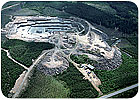
One of Finland's leading granite producers, Palin Granit Oy has continued to grow, and it recently opened a new quarry for exclusive Baltic Brown De Luxe, which has a warm, deep brown color.
Founded in 1921, Palin Granit Oy proudly points out that it is the largest family-owned granite quarrier in Northern Europe. The company, which is based in Turku, Finland, has become one of the leading producers of granite on a worldwide scale, and it continues to expand its operation in terms of production and new quarry sites.

Production within Palin Granit's quarries has been steadily increasing, and this year, the company expects to reach a yearly production total of 40,000 cubic meters.
Company history
The company formed when Antti Palin, a traveling stonemason, started Antti Palin Loimaan Kiviveistämö in 1921, an operation that he managed for 37 years. He was succeeded in 1958 by his sons Reino and Martti Palin, who had already been in the business for more than 10 years.Finland's stone industry was going through great changes at this time, and Reino Palin was one of the pioneers in mechanizing the business, whereas Martti Palin focused on customer relations and sales. Their cooperation promoted the development of the company, and the range of products extended from tombstones and construction stones to stone for interior design and sculpture.
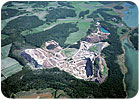
Palin Granit's original quarry for Balmoral Red granite - which is considered to be one of the “classic†materials of Finland - yields approximately 700 cubic meters of material per month. To clarify some confusion in the marketplace, Palin Granit pointed out that true Balmoral Red granite is only quarried in southwest Finland.
Heikki Palin has promoted the company's growth by expanding its quarry operations, and today, Palin Granit Oy has 12 quarries under its ownership.
In 1999, the Palin Group was granted the “Entrepreneur of the Year†award for its sustained activities in the stone business.
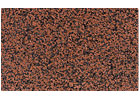
In addition to monuments and interiors, Balmoral Red has gained popularity as a large-scale building product, and it has been used in projects around the world.
Block production
Palin Granit sells its material in block format, and over 90% of the company's production is exported, reaching all corners of the world - including Europe, America, the Middle East, the Far East and Australia.Recently, Palin Granit opened a new quarry for exclusive Baltic Brown De Luxe. This granite has a warm, deep brown color that matches well with different types of wood used in the kitchens, and the material is available from the leading stone manufacturers in different sizes.
The main part of Palin Granit's production in large blocks comes from its Balmoral Red, Eagle Red, Carmen Red and Baltic Brown quarries. Granite is also available in both large and small blocks from its Aurora and Baltic Green quarries.

Material is extracted using hydraulic drilling units, and the company has also invested in the newest hydraulic splitting units in the marketplace.
Palin Granit pointed out that true Balmoral Red granite is only quarried in southwest Finland. However, due to the material's high-quality reputation and its classic position among granites, the “Balmoral Red†name has been improperly used for other red materials, creating confusion among the producers and end users.
Production within Palin Granit's quarries has been steadily increasing, and totals in recent years were 33,800 cubic meters (2002), 35,400 cubic meters (2003), 35,200 cubic meters (2004) and 35,700 cubic meters (2005). This year, Palin Granit expects production to reach a total of 40,000 cubic meters.
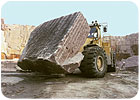
All of the quarries operate year-round, even in the colder winter months.
Palin Granit has approximately 80 direct employees and 20 subcontractors in the operation. While the company's main consumers are China, Italy, Spain, Germany, Poland, Taiwan and France, it has also noted several emerging markets, such as the Baltic countries, India, Russia and the Near East.
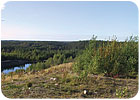
Quarry areas are restored after quarrying operations.
Sidebar: Palin Granit and the environment
by Dr. Olavi Selonen, Environmental Manager, Palin Granit OyNatural stone quarrying is strictly regulated by Finnish legislation. By maintaining internal control and staff training at Palin Granit, we are ensuring the license conditions and environmental codes in our everyday operations.
Environmental management systems
ISO 9001 and 14001
We have built up a quality and environmental management system in accordance with ISO standards. This system has created essential conditions for the development of our operations. With the assistance of the quality and environmental policy, goal setting and implemented environmental studies - such as groundwater follow-up and noise level measurements - we are able to reduce the environmental effects of our quarrying operations. Moreover, the environmental issues are continuously managed by the environmental manager.
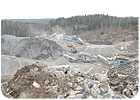
The use of leftover stone increases the overall acquisition of the deposit and contributes to a higher total recovery of the quarry. It also allows for more eco-efficient and sustainable use of stone.
Quarrying, like other industrial operations, produces waste through the use of its machines and other materials. In all operations, Palin Granit follows strict waste management codes. We are sorting our waste, recycling as much as possible and delivering it to the proper processing locations. In addition to the quarries, our company also has two machine repair shops, which maintain the quarrying machinery. The condition of the machines is an essential factor in both the quality of the work and the environmental effects of quarrying.
Utilization of leftover stone from quarries
Leftover stone is produced in connection with stone quarrying. And while the leftover stone does not fulfill the high-quality demands set for dimensional stone, it is a pure raw material, which can be utilized in many ways - such as in roads and breakwater construction, or as environmental stone. Potential new uses for the leftover stone is continuously studied by Palin Granit.
Landscaping
A visible effect of stone quarrying is the alteration of the landscape, and this change can be lessened by thoughtful landscaping work. In the final stages of operation, the area is cleaned up, and saplings are planted in places where reforestation has not already naturally begun. The quarry is usually filled with groundwater and rainwater, and it can then be used as a freshwater reservoir or recreation area.